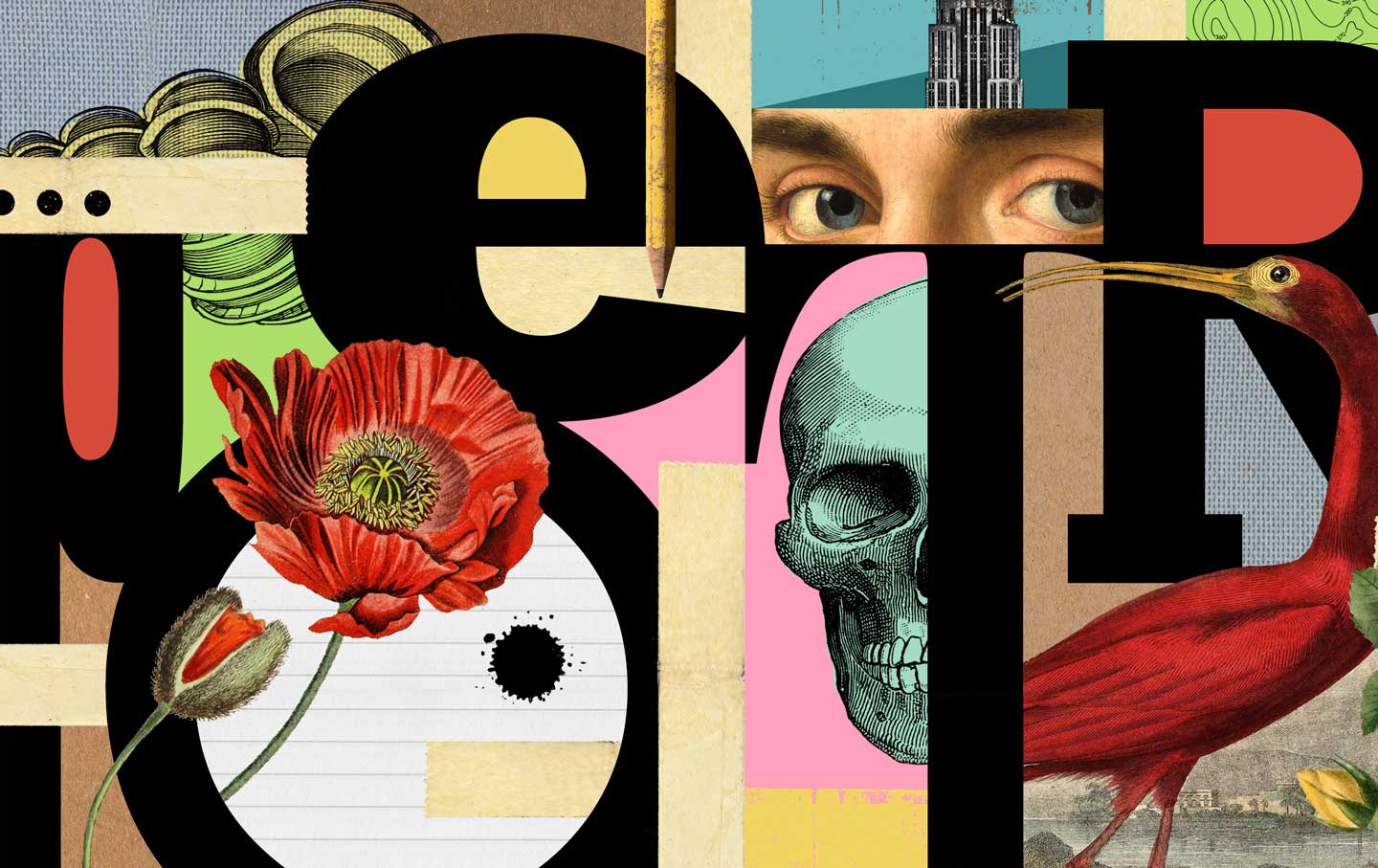How Snow White Got Caught Up in Hollywood’s Culture Wars
How “Snow White” Got Caught Up in Hollywood’s Culture Wars
Disney’s box-office bomb has spawned a series of Gaza-and-Trump-themed recriminations.
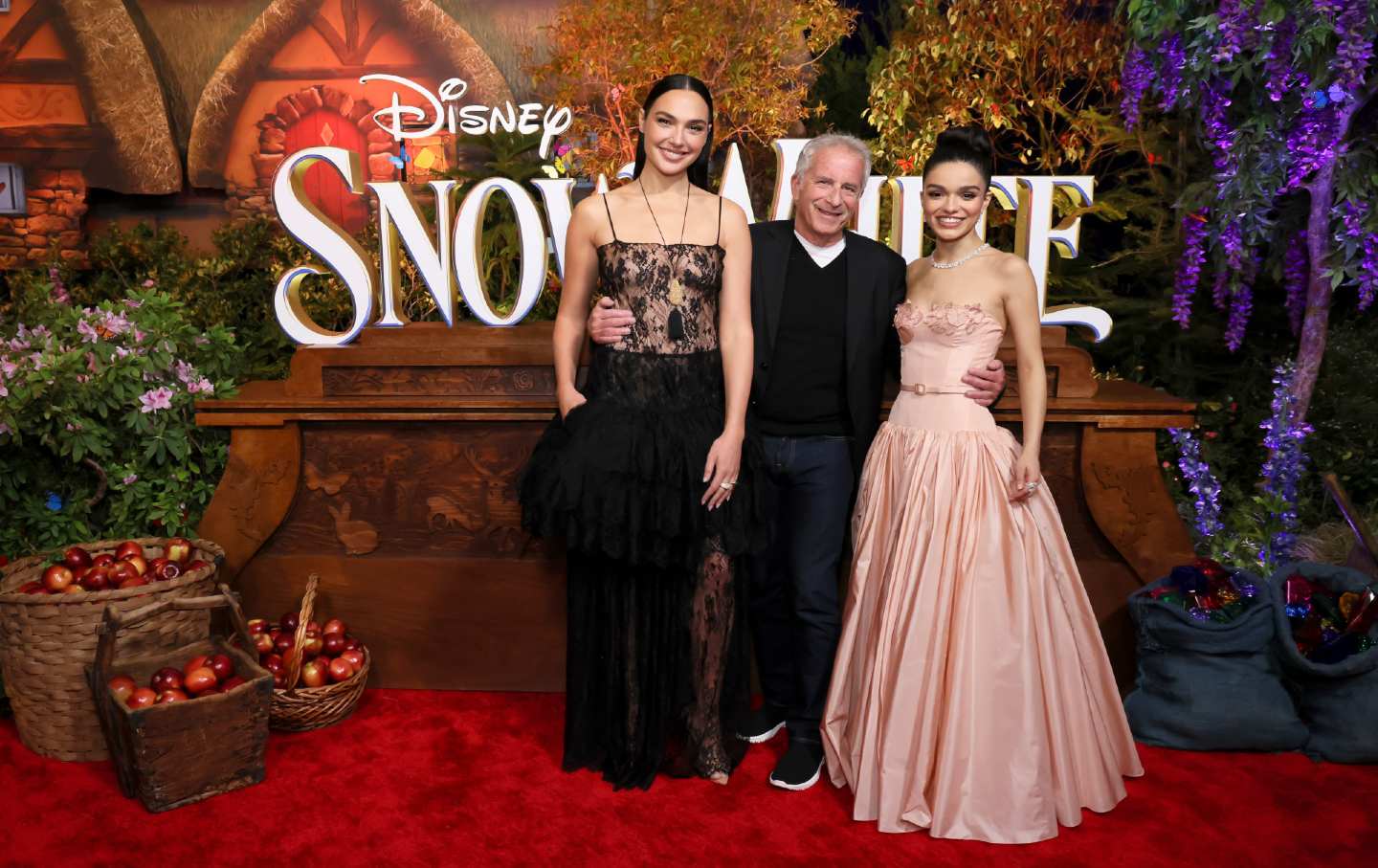
Snow White costars Gal Gadot (L) and Rachel Zegler flank Disney producer Marc E. Platt at the film’s global premier.
(Photo by Rodin Eckenroth/Getty Images for Disney)It’s rare you ever hear anyone say this, but if you haven’t taken the kids to the new Disney family movie, you better hurry. It won’t be in theaters long.
Snow White, Disney’s new live-action retelling of one of the most iconic properties in its vast intellectual property vault, cost around $270 million, and only earned back about $42 million on its opening weekend. Compare that to Disney’s other recent photorealistic IP release: Mufasa (2024) which revisits The Lion King (1994). It came out last December, cost $200 million, and has made $721 million worldwide so far—a good bottom-line benchmark for the level of corporate dismay over Snow White’s inauspicious launch.
There’s no need to cry for Disney, which will be fine—but the failure of Snow White has revealed a tragic kingdom’s worth of industry backbiting, politics, and culture warfare. After Snow White flopped, a classic, anonymously sourced Hollywood whisper campaign arrived via Variety reporter Tatiana Siegel about the many perceived transgressions of Rachel Zegler, the star of the film. The Hollywood Reporter’s autopsy on the massive commercial failure of Joker: Folie à Deux unleashed a similar torrent of anonymous “insiders” eager to pin the blame on someone, and as in the case of Snow White, they chose its star, Joaquin Phoenix. Portraying him as whimsical and vain, they dismissed the movie as “a very expensive art house film,” based on a dream of Phoenix’s, meant for an audience of one— Joaquin Phoenix.
In Zegler’s case, it’s no surprise that the insiders focused on her very public pro-Palestinian, anti-Trump social media posting. Pro-Palestinian voices in Hollywood have been feeling pushback ever since Hamas’s October 7 attack on Israel, and Disney has battled MAGA on multiple fronts for years, from toxic fan attacks for casting actors of color in Star Wars movies to last week’s announcement that Trump’s Federal Communications Commission would be reconsidering ABC’s broadcast license over DEI issues.
The culture-war politics of Snow White began with the casting of Israeli actress Gal Gadot as the Evil Queen and a Latina—Zegler—as Snow White. The news of Gadot’s casting itself brought talk of a boycott, and casting an other-than-lily-white actress in the title role is always troll bait enough for MAGA partisans. After a trailer for Snow White dropped last August, Zegler thanked fans on X for watching, and then added, “and as always, free palestine.” Why make a point of broadcasting her views on the Gaza War while promoting a Snow White trailer, of all things? Zegler has been publicly supportive of Palestine since 2021 and advocated early on for a ceasefire in the Israel-Hamas War. In the past, Gadot, an IDF veteran, had posted on Instagram about the sexual violence inflicted on Israeli women during the October 7 attack and helped organize Los Angeles screenings of a documentary about the attacks, Bearing Witness (2023). When Gadot shared an Instagram post of the costars embracing on August 10, 2024, Zegler made her “free palestine” comment on X.com two days later. As The Guardian reported, fans of both actors read a great deal of politics into that. Disney’s belief that it could keep a lid on any of this in the post-10/7 social media world is a new level of Magical Kingdom Thinking.
Siegel reported that after Zegler’s “free palestine” post, Snow White producer Marc Platt personally flew to New York to discuss decoupling her personal views from the movie’s promotion. A former head of Universal, Platt knows what he’s doing with massive IP franchises; his adaptation of Wicked (2024) has made $747 million worldwide so far and netted several Oscar nominations. Platt is also an arch-defender of Israel who had reportedly demanded that Boots Riley be dropped by WME, Riley’s agency, after asking people to boycott Bearing Witness, which Riley called “murderous propaganda.” Platt denies that charge, but does acknowledge bringing the posts to the agency’s attention.
Siegel’s Variety piece only quotes insiders convinced that audiences care about Zegler’s politics, but not Gadot’s—a position that reveals a disconnect from reality. If Disney’s target demographic for Snow White cared about Middle East politics, Gadot’s status as an IDF veteran would likely be a bigger problem for the film’s global marketing than Zegler’s calls for a ceasefire. Zegler’s views no doubt alienated some, but Variety never considers that expressing support for Palestine would also be a box-office draw for members of the anti-Zionist TikTok generation. Nor did it apparently pause to note that there are plenty of bankable stars of all political stripes who continue to appear in fare at least as harmless as Snow White—which is why leftists like Susan Sarandon and Jane Fonda continue to pop up in senior-themed rom-coms, and Gary Sinise and Jon Voight appear as loveable Everymen, when their politics are anything but warm and fuzzy.
As polarizing and agonizing as the Gaza war has been, Gallup and Harvard/Harris polls show it did not even crack the top 10 issues that decided the last US presidential election. Who knows, maybe Gadot- and Zegler-haters all stayed home on opening weekend in a perfect storm of cancellation, but there’s nothing to seriously suggest their Middle East politics crashed Snow White. Platt’s own Wicked and Disney’s Mufasa can also be said to have saturated the recent marketplace for Snow White, which critics have roundly decried on purely aesthetic grounds as lackluster-to-awful.
Besides, one of Hollywood’s loudest and sharpest critics of Israel’s treatment of Palestinians, and a staple of Disney’s Marvel movies as The Hulk, is Mark Ruffalo. He’s gone much further than Zegler on social media, at one point calling the Israeli occupation of Palestine a “genocide.” He later took that word back—but he’s never backed down on his support for the Palestinian cause. He continues to post about politics and Marvel to his 19.9 million Instagram followers, and no disgruntled industry insiders have argued that Ruffalo’s politics hurt Marvel.
Ruffalo recently cosigned the Academy letter in support of Hamdan Ballal, the Israeli-Palestinian Oscar winner for No Other Land arrested by Israeli security forces in the West Bank. After the Academy thought it best not to comment on Ballal’s arrest at all, hundreds of members, including Ruffalo, shamed them into making a statement in support of its own awardee. That letter announced, “We stand in condemnation of the brutal assault and unlawful detention of Oscar-winning Palestinian filmmaker Hamdan Ballal by settlers and Israeli forces in the West Bank.… The targeting of Ballal is not just an attack on one filmmaker—it is an attack on all those who dare to bear witness and tell inconvenient truths.”
Pro-Palestinian politics are nothing new for Ruffalo, and Disney has already announced his return in next year’s Avengers movie. Of course, Ruffalo also isn’t tagging Avengers trailers with “and as always, Hulk smash puny Netanyahu!”
For Disney, that’s the real issue. Zegler crossed a company red line by mixing up its brand with her personal politics. Disney has a long history of coming down hard on that. In 2017, ESPN sports commentator Jemele Hill created a loud controversy when she called Donald Trump a “white supremacist” on X (then Twitter): “Trump is the most ignorant, offensive president of my lifetime. He is a direct result of white supremacy. Period.” Later, she tweeted critically about Dallas Cowboys owner Jerry Jones for his opposition to players kneeling for the national anthem to protest police violence against Black people in custody. History has proven her absolutely correct on Trump, but Disney, which owns ESPN, suspended Hill for violating its social media policies. She soon parted ways with the Mouse House for a new career podcasting and writing for The Atlantic. On the MAGA side, Disney fired actor and UFC star Gina Carano from its Star Wars series The Mandalorian. Besides her anti-trans, anti-masking, and 2020 election fraud posts, she also compared the treatment of Republicans in America to that of Jews in Nazi Germany.
Popular
“swipe left below to view more authors”Swipe →No industry “insiders” accused Hill or Carrano of tanking the ratings of their shows as they did in Zegler’s case. Disney simply hates talent acting in a way that distracts from its brand, especially with Trump politics pro or con—and apparently, that offense is most intolerable to the keepers of the company’s image when it’s committed by women. The studio has so far refrained from publicly weighing in on what Zegler thinks about Palestine any more than it has in Ruffalo’s case. Tellingly, Disney got active when Zegler posted about Trump’s November win. “There is also a deep, deep sickness in this country that is shown in the sheer amount of people who showed up for this man who threatens our democracy.… Sending love to everyone who needs it today.” Other comments included, “Fuck Donald Trump,” and as magical princesses are wont to do, Zegler put a curse on all of MAGA: “May Trump supporters…and Trump himself never know peace.”
And like a plot twist in a fairy tale, Zegler’s spell boomeranged on her. The Disney empire has been in the crosshairs of the MAGA movement since 2021. Florida Governor Ron DeSantis and now the Trump White House have been after the company on multiple fronts. In 2021, Disney opposed the DeSantis-backed Parental Rights in Education Act, which critics labeled the “Don’t Say Gay” bill. It limited what could be taught in Florida classrooms about gender identity and sexual orientation. DeSantis responded by trying to revoke a self-governing policy which allowed Disney state-free control of some of its properties. Disney—as many observers saw it—responded by promoting a Disneyland Pride event. DeSantis then threatened to build a state prison next to Walt Disney World.
Today, MAGA continues its assault on Disney. Last week, in a move to get the company to back down on its DEI policies, the Trump administration’s FCC chair, Brendan Carr, ordered an investigation into Disney-owned ABC that threatens its broadcast licenses. That announcement came after ABC’s $15 million settlement of Trump’s lawsuit against George Stephanopoulos for comments the Sunday-morning host made about Trump’s sexual assault trial. Disney has also modified its labeling of older movies to appease MAGA. That messaging acknowledged founder Walt Disney’s penchant for negative stereotyping and unflattering depictions of marginalized groups. Labeling on Peter Pan (1953) and Dumbo (1941) that once included warnings that they contain “negative depictions and/or mistreatment of peoples or culture” now read, “This program is presented as originally created and may contain stereotypes or negative depictions.” It also got rid of its Reimagine Tomorrow website, which focused on marginalized and underrepresented communities.
With Trump’s 2024 win, Disney no doubt knew what was coming, and did not need its newest Disney princess to post “Fuck Donald Trump.” The core hatred that MAGA has for inclusion and representation makes a culture-shaping Goliath like Disney a top target. Despite that, Disney still greenlighted movies like Barry Jenkins’s Mufasa—and cast a Latina actress in the role of Snow White.
Disney isn’t erasing or deleting all of its inclusion initiatives (yet), but Zegler’s blunt social media style offered a provocation the studio did not need as its news, film, and broadcast divisions are under siege by MAGA. Zegler has said she did not realize her comments had such wide-ranging impact, and posted an Instagram apology: “Hi everyone, I would like to sincerely apologize for the election post I shared on my Instagram last week. I let my emotions get the best of me.… Hatred and anger have caused us to move further and further away from peace and understanding, and I am sorry I contributed to the negative discourse.”
According to reports, the studio also sent Zegler a social media guru to work on her posts. Let’s hope it was Mark Ruffalo.
More from The Nation

“The Paper” and the Return of the Cubicle Comedy “The Paper” and the Return of the Cubicle Comedy
The new show from the creators of The Office reminds us that their comedic style does now work in every “workplace in the world.”
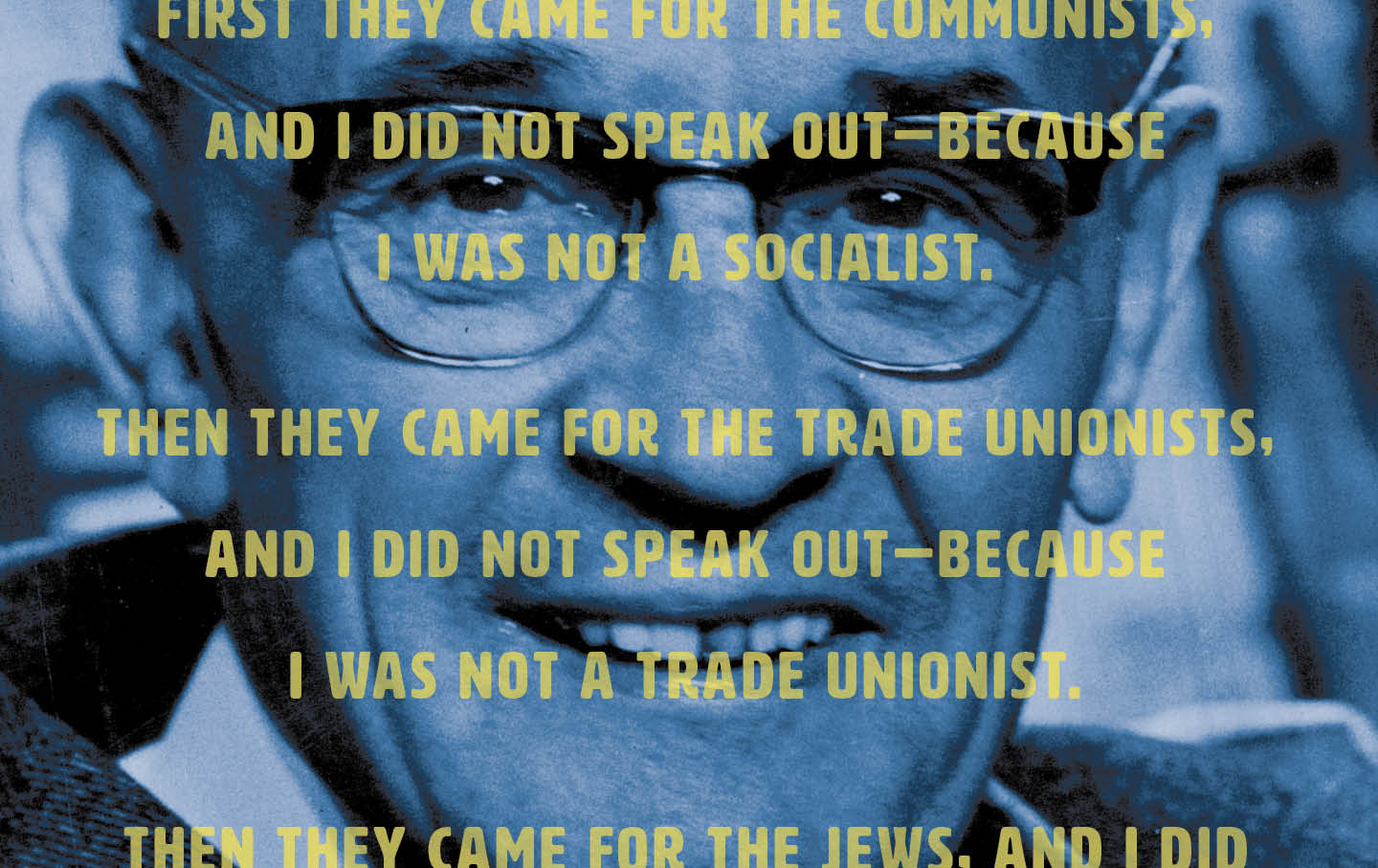
The Strange Story of the Famed Anti-Fascist Lament “First They Came…” The Strange Story of the Famed Anti-Fascist Lament “First They Came…”
In his celebrated mea culpa, the German pastor Martin Niemöller blamed his failure to speak out against the Nazis on indifference. Was that the whole reason?
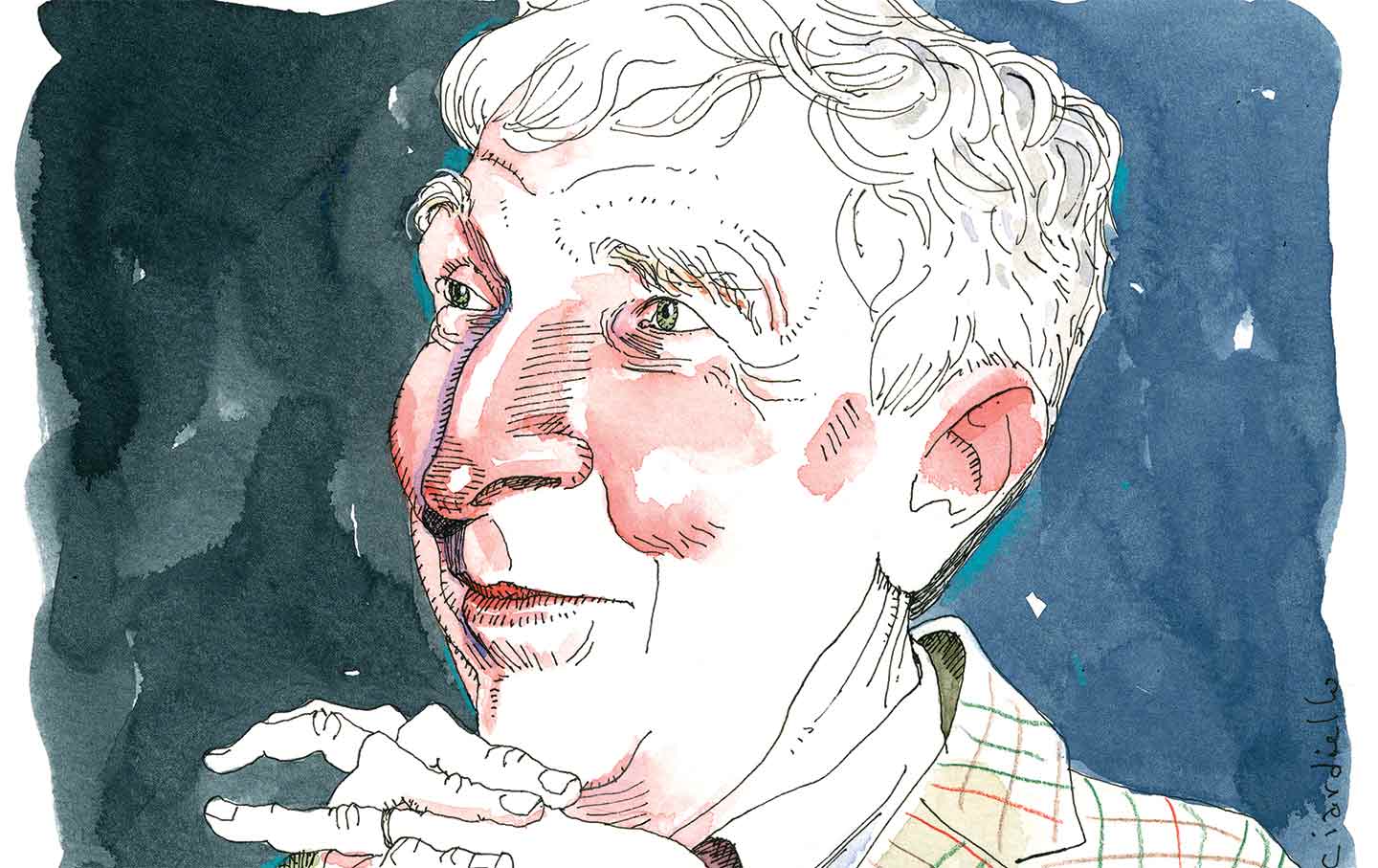
John Updike, Letter Writer John Updike, Letter Writer
A brilliant prose stylist, confident, amiable, and wonderfully lucid when talking about other people’s problems, Updike rarely confessed or confronted his own.

The Grand Delusions of “Marty Supreme” The Grand Delusions of “Marty Supreme”
Josh Safdie’s first solo effort, an antic sports movie, revels in a darker side of the American dream.
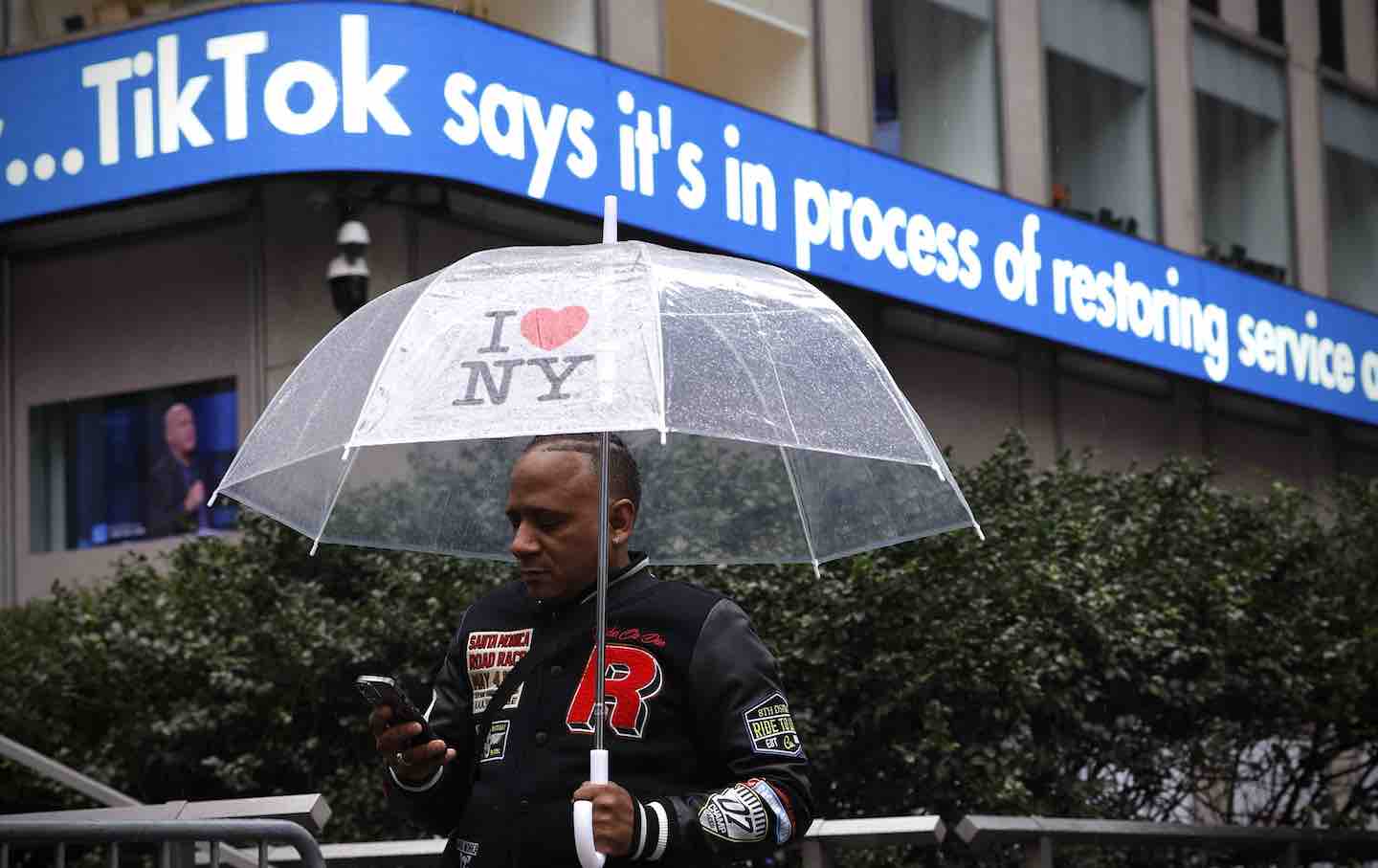
TikTok’s Incomplete Story TikTok’s Incomplete Story
The company has transformed the very nature of social media, and in the process it has mutated as well—from tech unicorn to geopolitical chesspiece.

